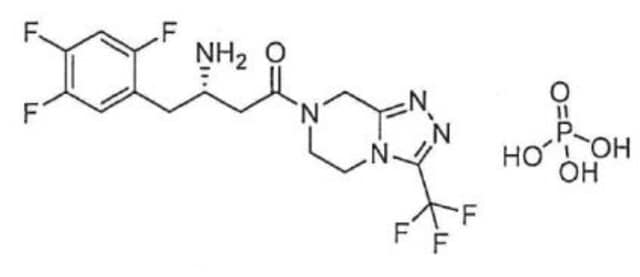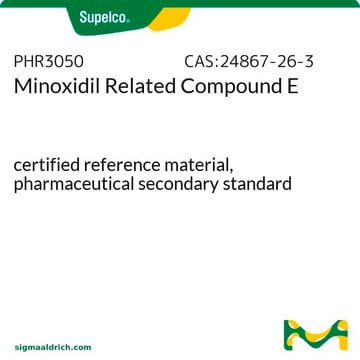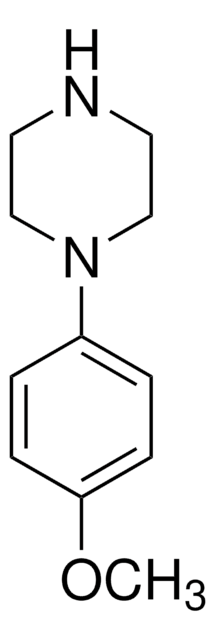1A02590
USP
1,4-BIS(4-(2,3-DICHLOROPHENYL)PIPERAZIN-1-YL)BUTANE DIHYDROCHLORIDE
Pharmaceutical Analytical Impurity (PAI)
Synonyme(s) :
1,4-bis(4-(2,3-dichlorophenyl)piperazin-1-yl)butane, hydrochloride
Se connecterpour consulter vos tarifs contractuels et ceux de votre entreprise/organisme
About This Item
Code UNSPSC :
41116107
Nomenclature NACRES :
NA.24
Produits recommandés
Qualité
pharmaceutical analytical impurity (PAI)
Agence
USP
Famille d'API
piperazine
Fabricant/nom de marque
USP
Application(s)
pharmaceutical
Format
neat
Température de stockage
2-8°C
Description générale
1,4-BIS(4-(2,3-DICHLOROPHENYL)PIPERAZIN-1-YL)BUTANE DIHYDROCHLORIDE is a USP Pharmaceutical Analytical Impurity (PAI).
USP PAI are a product line of impurities suitable for research and analytical purposes, which help to ensure the quality and safety of medicines.
Associated Drug Substance: Aripiprazole
For more information about this PAI, visit here.
USP PAI are a product line of impurities suitable for research and analytical purposes, which help to ensure the quality and safety of medicines.
Associated Drug Substance: Aripiprazole
For more information about this PAI, visit here.
Application
1,4-BIS(4-(2,3-DICHLOROPHENYL)PIPERAZIN-1-YL)BUTANE DIHYDROCHLORIDE (USP PAI) is intended for use in analytical testing to detect, identify, and measure pharmaceutical impurities.
Caractéristiques et avantages
USP PAI advance your early analytical R&D and process development. PAI can be used in the following applications:
1. Conduct analytical tests during early formulation feasibility studies.
2. Determine degradation impurities produced during stress studies.
3. Develop, validate, and transfer analytical methods.
4. Perform spiking studies during process R&D to demonstrate depletion upon recrystallization.
5. Record retention times and/or spectra
6. Determine relative response factors.
7. Identify unknown impurities that formed during ICH stability conditions.
8. Identify impurities that are present in the Reference Listed Drug
9. Test for and profile impurities not listed in drug substance and drug product monographs.
1. Conduct analytical tests during early formulation feasibility studies.
2. Determine degradation impurities produced during stress studies.
3. Develop, validate, and transfer analytical methods.
4. Perform spiking studies during process R&D to demonstrate depletion upon recrystallization.
5. Record retention times and/or spectra
6. Determine relative response factors.
7. Identify unknown impurities that formed during ICH stability conditions.
8. Identify impurities that are present in the Reference Listed Drug
9. Test for and profile impurities not listed in drug substance and drug product monographs.
Remarque sur l'analyse
These products are for test and assay use only. They are not meant for administration to humans or animals and cannot be used to diagnose, treat, or cure diseases of any kind.
Autres remarques
Sales restrictions may apply.
Code de la classe de stockage
11 - Combustible Solids
Classe de danger pour l'eau (WGK)
WGK 3
Point d'éclair (°F)
Not applicable
Point d'éclair (°C)
Not applicable
Certificats d'analyse (COA)
Recherchez un Certificats d'analyse (COA) en saisissant le numéro de lot du produit. Les numéros de lot figurent sur l'étiquette du produit après les mots "Lot" ou "Batch".
Déjà en possession de ce produit ?
Retrouvez la documentation relative aux produits que vous avez récemment achetés dans la Bibliothèque de documents.
Notre équipe de scientifiques dispose d'une expérience dans tous les secteurs de la recherche, notamment en sciences de la vie, science des matériaux, synthèse chimique, chromatographie, analyse et dans de nombreux autres domaines..
Contacter notre Service technique







